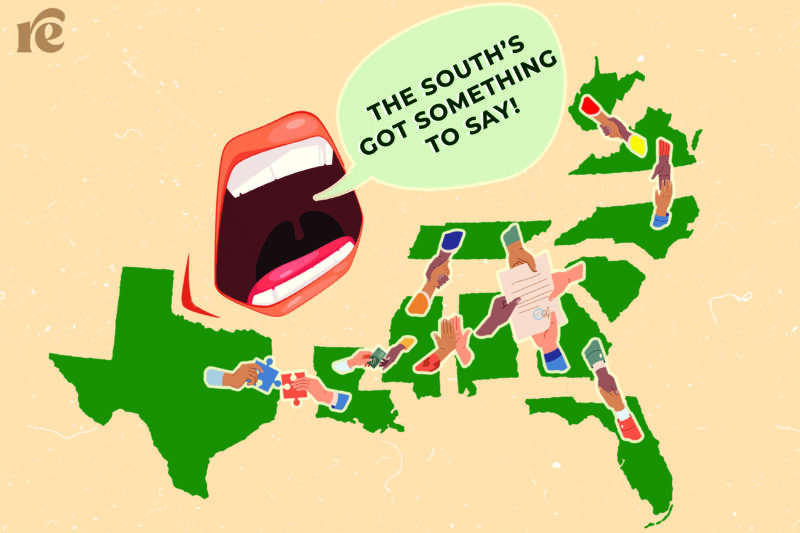Why We Need to Let Southern Social Justice Activists Lead
The people closest to the problems are often closest to the solutions—that includes Southern advocates fighting for sexual and reproductive health.

Five years ago, national social justice groups arrived in Mississippi after federal immigration officials arrested 680 workers at seven food processing plants. Fresh from the airport, some sought to usurp Mississippi advocates’ coordination of the response to the largest U.S. immigration raids in recent U.S. history. They pushed aside respected local community organizers and other leaders who had extensive community roots and a deep understanding of their neighbors’ needs. One veteran local organizer told us that a national organizer went so far as to demand that she get out of the way and follow his lead.
As a community lawyer at the Mississippi Center for Justice, I spent the months after the immigration raids helping impacted families access Medicaid and other public benefits and watching those dynamics unfold. While not a Southern native, I called the region home for most of my 20s, working with and learning from fierce, technically expert, and visionary Southerners.
Along the way, I interacted with national advocates who were intentional and supportive partners, and those whose actions reflected the problematic and all-too-common view that they must “save the South from itself.” I learned that being a good partner to Southern advocates requires asking what they need to advance their vision and operating accordingly.
Since leaving Mississippi to join the National Health Law Program (NHeLP), I have continued to witness harmful power dynamics. For example, since the Supreme Court’s decision in Dobbs v. Jackson Women’s Health Organization, some national groups have more forcefully sought to impose their goals and strategies on their Southern sexual and reproductive health, rights, and justice peers. These groups have failed to recognize that the people closest to the problems are often closest to the solutions. They have missed opportunities to learn and provide meaningful support.
Regardless of intent, it seems that baseless beliefs that Southern advocates aren’t knowledgeable, resourceful, or strategic are often at the root of these behaviors.
We must ask our Southern peers how we can better leverage our resources and power to help advance their vision instead of making assumptions, listen deeply, and follow through.
These same dynamics show up when national advocates make disparaging, monolithic comments about the South. I’ve heard some say that the South is backward—that it deserves what it gets after Dobbs. Others urge Southern partners to come to them for a meeting, wishing to avoid travel to the “unsavory” locations of the injustices they claim to want to solve.
These sentiments erase the generations of Southerners who launched and were at the forefront of U.S. civil rights, health justice, and other social justice movement organizing and innovation. They bypass the Black, Indigenous, and other people of color, disabled and LGBTQI+ people, immigrant families, and other Southerners fighting to survive amid a sea of social injustices. They overlook the millions who are desperate for Medicaid expansion; sexual, reproductive, and gender-affirming health-care access; and representation in government. It’s no wonder they undermine our Southern peers’ trust.
To be sure, the South is a locus of many social injustices, from reproductive and gender oppression to voter suppression. But these injustices persist not because Southern social justice advocates are incapable or need redirection—inadequate resources to support Southern legal, policy, and political advocacy and organizing play a major part.
When national advocates undercut, fail to truly listen to, or otherwise disempower our Southern partners, we make matters worse.
While any national advocates working with Southern partners will likely make missteps, some recognize that we have much to learn from them and are committed to upending damaging power dynamics. Just months after I joined NHeLP in early 2020, a colleague at Mississippi-based Converge: Partners in Access raised the need for a network of Southern advocates fighting to foster sexual and reproductive health, rights, and justice in Medicaid. For over 55 years, NHeLP has strived to build partnerships rooted in trust and mutual respect that further our state partners’ priorities, including through our longstanding Health Law Partnerships, so our leadership was immediately supportive of the idea. That summer, we held listening sessions with Southern partners to better understand their needs.
Today, our multi-movement coalition—guided by our steering council, Birth in Color: RVA, Converge, the Kentucky Equal Justice Center, the Mississippi Center for Justice, and the Yellowhammer Fund—represents more than 30 organizations across 13 Southern states. In this generative space, Southern advocates share and workshop winning strategies to close sexual and reproductive health coverage gaps in Medicaid; fight discrimination; and defend against attacks on access to care. For our part, NHeLP has provided legal technical assistance, coordinated strategy summits, and since last year, delivered pass-through funding to help further the advocacy priorities our Southern partners identify.
As national social justice advocates, we must ask our Southern peers how we can better leverage our resources and power to help advance their vision instead of making assumptions, listen deeply, and follow through.
After all, as the legendary civil rights movement leader and Mississippian Fannie Lou Hamer said, “nobody’s free until everybody’s free” and “it’s time for America to get right.”
Correction: This piece was updated to reflect the accurate date of the immigration raids in Mississippi.
